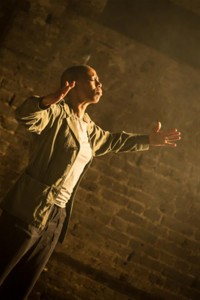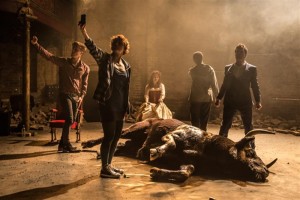What’s the most haunting moment of Carmen? The rousing toreador’s song? One of the stompy dances? Carmen’s own teasingly lush habanera? Maybe. Or maybe it’s the wordless, taunting snatch of melody with which Carmen taunts Don José – the soldier already in thrall to her, dick and epaulettes caught in a hopeless struggle. ‘Tralalalala,’ she hums, as if to herself. ‘Tralalalala.’
It the perfect, wordless expression for a heroine who refuses to be known, to be expected, to be tied down. Words, even your own, can be incriminating. She wants out. Always – and even if her body is locked up, her heart and mind are already out the window.
A protagonist whose trajectory is out of here will always be a disruption. In a story in which the irresistible object of desire – a woman, a man, the tang of freedom – is the thing that dooms you. Carmen Disruption, a scalding play by Simon Stephens – first performed in Hamburg last year, now directed at London’s Almeida Theatre in a breathstoppingly beautiful production by Michael Longhurst – isn’t Carmen, Disrupted. It’s Disruption – because that’s what the character, the opera, the play all are.
Object of desire
The idea came to Stephens after meeting mezzo-soprano Rinat Shaham. Carmen is her calling card, and has taken her to opera houses around the world. Another suitcase, same old gypsy. Unpack the luggage, tralala. Stephens imagines a singer with a similar career, fetched up blearily to in a city she may recognise to sing a role she does in her sleep. We’re in a city, nameless, European. A place where people come on business, leave at the first opportunity. A transient throng of tourists, students, one-percenters and the people who service them.
Carmen is what she knows, what she can cling to, so the singer (Sharon Small) recognises four people she encounters as archetypes from the opera. José (Noma Dumezweni, pictured top by Marc Brenner) is a female cabdriver, all her attention fixed on a meeting with her son years after she walked away from her first marriage. Micaela (Katie West) is a truculent, lost student, dumped by her ageing professor. Escamillo, the strutting toreador is an equally puffed-up financier (John Light). And Carmen? If not technically on the game, Bizet’s heroine is willing to monetise flirtation. The opera’s object of desire has here become a pro: Jack Farthing’s rentboy, cutting a swathe in a leather jacket and Pierre Cardin silk scarf.
Lost in their own lives
Nineteenth-century opera is good on desire. It’s the throb of larynx in extremis: the pulse-raising aria, the head thrown back, the chest expanding. Snatches of Bizet’s opera curl, half-remembered through Simon Slater’s soundscape – and Viktoria Vizin’s vinious mezzo, a plush velvet sound rare in so intimate a theatre, is beguilingly exotic, almost shocking.
In Bizet, characters pursue what they want, or think they want, with heedless determination. Their love, their cash, their way out. It’s almost frightening, especially when their desires conflict. Stephens’ characters don’t know what they want. Money – for what? Love – for who? Escape – where? The plot points through which Bizet’s people plunge and scrabble are here skipped over, almost casually. John Light’s Escamillo loses a fortune and has it gifted back – and elides both situations, one by gagging, the other in an entitled grin. Soldier José is caught up in smuggling, agonises uselessly about it and is nicked, poor sap. Cabdriver José has to do something deeply criminal but barely explained, and gets away with it. That isn’t the point. The point is something she can never have again – an uncomplicated maternal bond. The kraken gravity of Noma Dumezweni’s voice is something I could listen to forever – a deeply considered, cat-tongued rasp, devastating when it describes José’s ache of being apart from, inching towards, her son.
This Carmen – look away, look away – does something more than start a catfight on the cigarette factory assembly line. But even that doesn’t haunt him, though it rattles him. Farthing’s voice inflects comic, inflects unaffected. What everyone comes to intuit is how they’ve been hollowed out by the sump of modern life. Crisscrossing, circling around the opera house, they haunt their own lives like ghosts. Sure, they cling to their phones, and an orange-lettered text screen almost mockingly scrolls through email notifications, song lyrics, train and airport information. The textual detritus of the city, leaving eyeballs behind.
If these people – if we – were happier, more leisured, they’d be flâneurs. They’d have a chance to watch as they wandered, like the gentlemanly first consumers of Bizet’s Carmen at the Opéra-Comique in 1874, thrilling to the Hispanic exoticism, piqued by the transgressive sex and spoken dialogue, startled to discover that this story was nothing and everything to do with them. Flâneurie is a boulevard-hopping habit for happier times. These people are lost in their own lives.
It isn’t a pretty show, or a neat one – but lord above, it’s beautiful. The iconic curved back brick wall of the Almeida – decaying for our delight since 1837 – has been concealed in recent shows, but here sashays forth in all its textured glory, enhanced by added rubble. The air is smoky – hazed and sulphurous, sometimes a beguiling gold. You can imagine a forbiddingly clean, glassy set, with the characters failing to gain traction on its shiny surfaces. Lizzie Clachan’s design reminds us that a city is an agglomeration of phantoms, present layered on past. There’s no corrida, but there’s a heavy bull, felled on the floor – we skirt around it to take our seats, and the light heightens its ink-suede solidity. Opera, that mausoleum artform, seems at home in this setting. It’s ravishing.
Lost characters. A sensual environment of music and tilted choreography (by Imogen Knight). A text of frowning lyricism. It’s a disorienting mixture, and when I left after 100 minutes, the city felt changed. Walking back through Islington, everything around seemed staged – the development drinks party in the foyer, all polite smiles and white wine; the middle youth working their chops in the cocktails and gelato joints down Upper Street; the have-nots and have-lots jostling beside each other; a tumble of blossom as the spring turned cold. Tralalalala in my head. I walked home, exposed and unseen.
Follow David on Twitter: @mrdavidjays



[…] Engaging Matters Published 2015-04-29 GPS Lady AJBlog: Infinite Curves Published 2015-04-29 Tralalalala AJBlog: Performance Monkey Published 2015-04-29 The Frank Strazzeri Film AJBlog: RiffTides […]